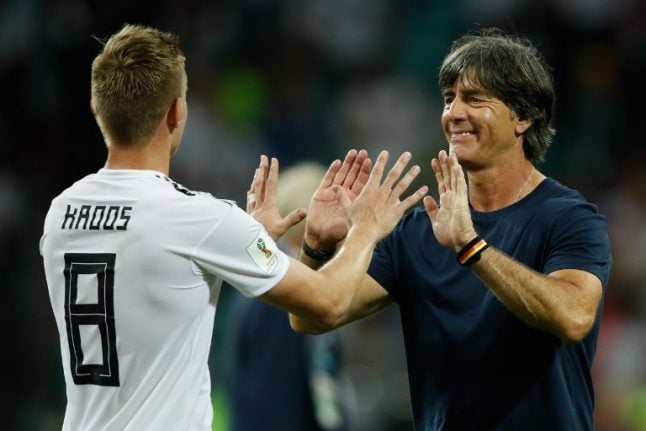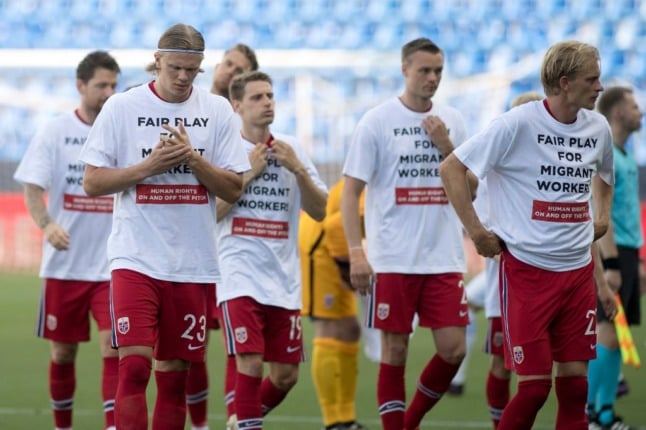WORLD CUP
German crisis averted for now, but World Cup holders have work to do
Toni Kroos's last-gasp winner ensured that Germany remain right in World Cup contention but the holders are not yet safe from the threat of an ignominious group-stage exit.
Published: 24 June 2018 13:10 CEST

Germany's midfielder Toni Kroos is congratulated by coach Joachim Loew (R) at the end of the match against Sweden on Saturday. Photo: ODD ANDERSEN / AFP
A 95th-minute free-kick from Kroos gave Joachim Loew's side a dramatic 2-1 victory over Sweden in Sochi on Saturday, after a Marco Reus strike had cancelled out Ola Toivonen's opener.
After beginning the defence of the trophy with a 1-0 defeat against Mexico in Moscow, another loss by the Black Sea would have eliminated Germany in the first round of the World Cup for the first time since 1938.
The spectre of the champions' curse has been hanging over the Germans, who were in serious danger on Saturday of following France (2002), Italy (2010) and Spain four years ago in becoming the fourth holders this century to be humbled in the group stage.
The intervention of Kroos means now it is all to play for in Group F. The four-time world champions must win by a margin of two goals against South Korea in Kazan to be absolutely sure of progressing. Failure to do so would mean relying on the outcome of the other match between Mexico and Sweden.
For now, at least, there is renewed optimism after a turbulent week.
Hummels to return
“We will look at the videos and see what we have to do better, but of course for our emotional side it was a very good thing today, because now if you have a game like this you start believing,” defender Mats Hummels said as he left Sochi's Fisht Stadium.
Of the winning goal from Real Madrid midfielder Kroos, who had earlier been at fault for Sweden's opener, Hummels added: “Something like this can be a big moment in the tournament.
“But if we lose against South Korea or don't make it to the next stage, the goal isn't worth anything, so we have to know that we got a little bit lucky and we have to show and to prove that we can be way better than we have been.”
The good news for Loew is that Hummels is likely to return for the final group game after being forced to sit out Saturday's match with a neck problem.
“The doc said it was too much of a risk that something very serious could happen,” said the 29-year-old, who was replaced by Chelsea's Antonio Ruediger.
Germany's other first-choice centre-back, Jerome Boateng, will be suspended in Kazan after being sent off against the Swedes.
Rudy breaks nose
More changes will therefore be required after Loew dropped the underperforming Mesut Ozil and Sami Khedira, bringing in Reus and Sebastian Rudy.
While Reus scored and came away with the man-of-the-match award on Saturday, Rudy lasted just 25 minutes before coming off with a bloodied nose.
“We have to take stock now, see what the situation is. We are tired,” said the coach. “Reus started having cramp in his legs, Boateng will not be in the line-up, Rudy broke his nose and we probably need a day of rest.”
Germany are defending a proud record of always reaching at least the last eight at the World Cup since winning the trophy in 1954. They have made it to at least the semi-finals at each of the past six major tournaments, going back to when Loew was Jurgen Klinsmann's assistant in the 2006 World Cup.
Yet it is looking increasingly possible that Germany could be on course for a last-16 showdown with Brazil, four years after the 7-1 of Belo Horizonte.
“Right now I don't think this is the time to start ruminating about that. There are still various possible outcomes,” insisted Loew.
By AFP's Andy Scott
Url copied to clipboard!


 Please whitelist us to continue reading.
Please whitelist us to continue reading.